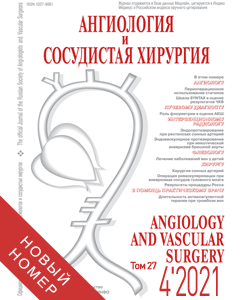Journal «Angiology and Vascular Surgery» •
2013 • VOLUME 19 • №3
Role of proinflammatory cytokines in the development and progression of micro- and macroangiopathies in patients with type 2 diabetes mellitus
Nelaeva A.A., Khasanova Yu.V., Khobotova E.S.
Endocrinological Dispensary, Department of Hospital Therapy with the Course of Endocrinology, Tyumen State Medical Academy, Tyumen, Russia
Diabetes mellitus is a systemic lesion of the micro- and macrocirculatory bed. We examined a total of 110 people with type 2 diabetes mellitus and lesions of the major vessels of the lower limbs. Of these, 70 patients were found to have microangiopathy combined with nephropathy. Diabetic nephropathy was classified depending on the level of microalbuminuria and the glomerular filtration rate. All patients were subdivided into three groups: diabetic macroangiopathy of the lower extremities with neither diabetic nephropathy nor chronic renal disease, lower-limb diabetic macroangiopathy combined with diabetic nephropathy in stage 1 of microalbuminuria of chronic renal disease and those in combination with diabetic nephropathy in stage 2 of microalbuminuria chronic renal disease. We measured the level of interleukine-6 and interleukine-8, tumour necrosis factor α, fibrinogen and the von Willebrand factor, revealing simultaneous progression of lower limb angiopathy in diabetic nephropathy, with direct interrelation between proinflammatory cytokines and the haemostasis system parameters. A decrease in the interleukine-8 level as nephropathy progresses may be indicative of exhaustion of angiogenesis, which is one of the factors of progression of macroangiopathy in patients with diabetes mellitus.
KEY WORDS: type 2 diabetes mellitus, lower limb diabetic nephropathy, interleukin-6, interleukin-8, tumour necrosis factor α, von Willebrand factor.
P. 13
ARCHIVES MAGAZINE
2021 (Vol.27)
2020 (Vol.26)
2019 (Vol.25)
2018 (Vol.24)
2017 (Vol.23)
2016 (Vol.22)
2015 (Vol.21)
2014 (Vol.20)
2013 (Vol.19)
2012 (Vol.18)
2011 (Vol.17)
2010 (Vol.16)
2009 (Vol.15)
2008 (Vol.14)
2007 (Vol.13)
2006 (Vol.12)
2005 (Vol.11)
2004 (Vol.10)
2001 (Vol.7)
2000 (Vol.6)
1999 (Vol.5)
1998 (Vol.4)
1997 (Vol.3)


